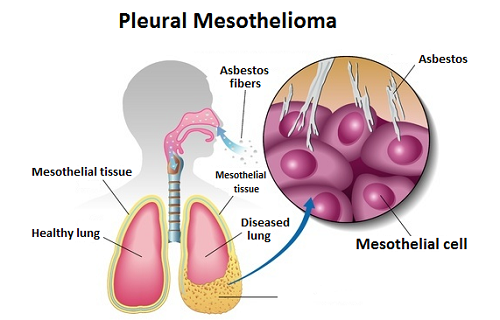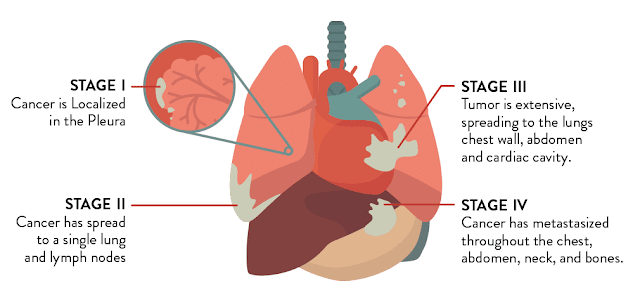Pleural Mesothelioma | Detailed Treatment, Prognosis & Diagnosis
Pleural Mesothelioma
Pleural mesothelioma is a rare cancer of the pleura, the lining of the lungs. It is the most common form of cancer caused by asbestos.

A pleural mesothelioma is a form of mesothelioma that affects the lining of the lungs, called the pleura. Although only about 3,000 new cases of mesothelioma are diagnosed each year, between 70 and 90% of the new diagnoses are pleural mesothelioma. Since it is the most common form of rare cancer, it is the most studied and has seen promising advances in treatment in recent years.
Although survival rates have improved slightly, patients with pleural mesothelioma still have a fairly low life expectancy, with only about 40% expected to survive more than a year after diagnosis.
What causes pleural mesothelioma?
Exposure to asbestos is the only definite cause of pleural mesothelioma, as is the case with its other forms. Very often, pleural mesothelioma is caused by the inhalation of asbestos fibers. Once inhaled, the durable fibers lodge in the lining of the lung, which is formed by two parts. The inner layer, known as the visceral surface, is a delicate membrane that covers the surface of each lung. The outer layer of the pleura is called the parietal surface and adheres to the wall of the chest. Asbestos fibers can be trapped in any of the layers, causing chronic inflammation and scar tissue that can develop into tumors over time.
Because the right lung is larger, it usually suffers more damage than the smaller left lung. But many patients with pleural mesothelioma often have tumor formation along the pleura, because the tumors grow rapidly and can spread easily throughout the lung cavity. If the disease becomes more advanced, the tumors can also spread to other organs, including the abdomen, diaphragm, lymph nodes, and heart.

Diagnosis of pleural mesothelioma symptoms
Like the other forms of mesothelioma, pleural mesothelioma is difficult to partially diagnose due to indistinct symptoms. Sometimes, this rare cancer has even been confused with flu, laryngitis, pneumonia, chronic obstructive pulmonary disease (COPD) and other more common lung or respiratory conditions. It has also been misdiagnosed as other lung cancers, such as adenocarcinoma.
Patients who experience any of these symptoms should consult their doctor about any possible past exposure to asbestos. Even if it happened years ago, no amount of exposure is considered safe and can help your doctor evaluate mesothelioma or other asbestos-related diseases.
With these nonspecific symptoms and the long latency period associated with all forms of mesothelioma, some patients have to wait weeks or even months before receiving an adequate diagnosis of pleural mesothelioma. Although the diagnosis usually begins with a variety of imaging tests to determine the presence of cancer, a biopsy is currently the only method to confirm pleural mesothelioma.
The biopsy will consist of taking samples of pleural tissue for the test. The doctor may also perform a thoracocentesis, or a pleural tap, which is a mildly invasive procedure that removes fluid from the pleura for analysis. A pathologist will determine if the cells are malignant, and if pleural mesothelioma is confirmed, they can also decipher the cell type.
Stages of pleural mesothelioma
Unlike other forms of mesothelioma, pleural mesothelioma has several staging systems that oncologists rely on to determine the progression of the disease. The most widely used and accepted, however, is the TNM Staging System, which stands for Tumor, Nodule, and Metastasis. Doctors will use the system to grade an area for each category, which will collectively make up the scenario.

Doctors can also use Brigham's staging system, which focuses on the ability of a tumor to be surgically removed, or the Butchart system, which focuses on the extent of the primary tumor and, in general, is considered more limiting. Regardless of the staging system used, the stage of pleural mesothelioma has a great impact on determining for which treatments a patient is eligible and its prognosis. A stage 1 patient, for example, will have more treatment options as curative surgery, compared to a stage 4 patient whose mesothelioma has probably spread to other parts of the body or the tumors are too large to remove.
Pleural mesothelioma prognosis
Like the other types of mesothelioma, patients with pleural mesothelioma also have a poor prognosis. Although it is the most common and most researched, doctors still face difficulties in diagnosing and treating the disease. Advances in treatment and ongoing clinical trials have provided hope for new and effective treatments, such as immunotherapy, which has already shown promise in extending the survival of some patients. On average, patients with pleural mesothelioma have a life expectancy of about one year, although several factors can influence an individual's prognosis such as stage, cell type, and patient's age.
The type of cell (epithelioid, sarcomatoid and biphasic) can also have a great impact on prognosis. Most cases of pleural mesothelioma have epithelioid cells, which account for 50-70% of all cases of mesothelioma. Epithelial cells have the best prognosis because they respond better to treatment.
Biphasic cells are the second most common and consist of a combination of epithelial and sarcomatoid cells. The prognosis for patients showing biphasic cells may vary, depending on which of the two cell types is more dominant. Sarcomatoid cells are the least common, difficult to diagnose (especially from the beginning) and have a higher probability of spread. As such, sarcomatoid mesothelioma generally has the worst prognosis.
Pleural Mesothelioma Treatments
Most patients with pleural mesothelioma are treated with a multimodal plan, which often consists of a combination of surgery, chemotherapy, and radiation. There are also many ongoing clinical trials that study the effectiveness of different combination therapies and new treatments. Immunotherapy, in particular, has shown promise for many cancers, including pleural mesothelioma. Researchers have seen promising results, with some patients extending their survival for months or even years.
For patients with early-stage pleural mesothelioma, there are two curative surgery options that are considered aggressive and invasive. The goal of either option is to eliminate as many tumors and cancer cells as possible to help relieve symptoms and improve life expectancy, but both surgeries face risks and potentially serious complications.
For patients who are not candidates for surgery or as part of a combination therapy, chemotherapy is another tool that is often used to treat pleural mesothelioma. Although a variety of combinations of chemotherapy drugs have been used for pleural mesothelioma treatment, the standard of care has remained as Alimta and cisplatin for many years. Alimta is currently the only chemotherapy drug approved by the FDA as a treatment for malignant pleural mesothelioma. With this treatment, studies have found median survivals of 12 to 16 months. Other combinations of chemotherapy, such as Avastin in combination with standard chemotherapy treatment, have had similar results, sometimes even extending survival to 19 months.

Radiation is also often used in combination with surgery or chemotherapy, and in some cases, it has been applied as a palliative treatment. A recent study explored patients with pleural mesothelioma treated with radiation therapy, either multimodally or individually, over the course of 10 years. The researchers found that radiation therapy improves overall survival, regardless of how it has been implemented in the treatment plan and should be a more commonly used tool to continue improving survival rates.
Emerging treatments
Clinical trials and research into new therapies and different combinations of even current standard treatments have helped to make great progress in improving the quality of life and overall survival of mesothelioma patients. In particular, immunotherapy has shown some success in the treatment of pleural mesothelioma and continues to be an important aspect of the investigation. Certain types of immunotherapy, such as the Keytruda checkpoint inhibitor, have allowed some patients to achieve greater survival, and with the further study is expected to be even more effective.
So far, these treatments are only available in clinical trials. Due to the rarity of the disease, it can be difficult for some patients to find or know what clinical trials are available and if they are eligible for any of the studies. Working with a mesothelioma specialist can help you learn more about clinical trials and emerging treatments, and determine if any of these options are right for you.
Specialists in pleural mesothelioma
Finding a mesothelioma specialist is an important aspect of your care, as they have experience in evaluating an individual case and in the treatment of the disease, which can ultimately help improve your prognosis. Many of these doctors also participate in research or lead clinical trials that test the latest and promising treatments.
Costs of pleural mesothelioma treatment
The costs of a diagnosis of pleural mesothelioma can quickly add up. Imaging scans and biopsies just to confirm a diagnosis can cost even more than $ 5,000 for a test, and treatment costs only continue to rise. Recent estimates show that a single cancer treatement can cost more than $ 120,000 for one year of treatment and can increase by up to almost 11% per year.
With large medical bills that approach the costs of everyday life and the possible secondary costs of this diagnosis, such as travel and accommodation, it is essential that patients and their loved ones take time to develop a financial plan. Everything from understanding your health insurance policy to finding some programs that can also help cover treatment costs can help offset this important financial burden.
Mesothelioma victims must also understand their legal right to file a claim and possibly receive compensation to help them cope with these medical expenses. Some states have a statute of limitations of only one year, so it is important to discuss your rights and legal options with a mesothelioma lawyer as soon as possible.








